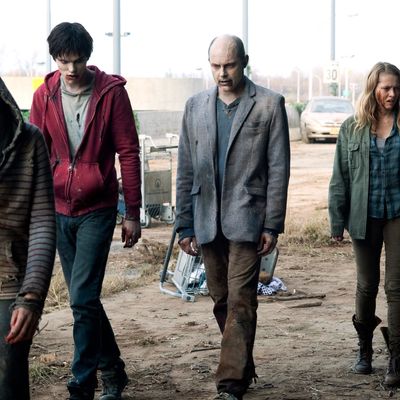
Warm Bodies is being billed as a zombie rom-com, which is unoriginal enough, but it’s not even that. It does start off with some stabs at comedy, as R (a suitably puppy-dog-ish Nicholas Hoult), a young zombie wandering through life (or I guess death), ruminates in nauseatingly ironic voice-over: “What am I doing with my life? … Why can’t I connect with people? Oh, right, ‘cause I’m dead.” That’s about as witty as the movie gets. For all of R’s allegedly humorous observations about the wasteland of the undead through which he walks, they feel tacked on — like somebody decided to turn this thing into a comedy at the last second.
R calls himself that because he can’t remember what his name used to be before the zombie apocalypse. He just remembers that it started with an R. Of course, we don’t need him to tell us his name; as soon as he meets Julie (a likable Teresa Palmer), one of a small gaggle of surviving human resistors, we realize it stands for Romeo. Julie’s father, played by a surprisingly earnest John Malkovich, is the leader of the resistance, and she’s a little conflicted about that, the same way R is conflicted about eating humans. Then R and his fellow zombies, among them his best friend M (Rob Corddry, wasted), ambush the young woman and her compatriots. R eats Julie’s boyfriend’s brain — which results in him acquiring the now-dead young man’s memories as well as a love for the young woman.
This could have been interesting, and for a brief moment, it is. A flashback to the dead boyfriend’s childhood memories, as R experiences them, is rather poignant — but the film drops this idea of one man inheriting another man’s emotional life and instead just settles for the zombie Romeo and Juliet thing, wherein R protects Julie from his fellow undead, and, later, she returns the favor. The action is surprisingly earnest — the film blows most of its “jokes” in its opening act — and it all builds to the usual business about the transformative nature of love, done in as halfhearted a way as possible.
Actually, a truly zombie Romeo and Juliet might have been interesting as well, but writer-director Jonathan Levine (The Wackness, 50/50), working off Isaac Marion’s novel, doesn’t go there. These zombies aren’t really zombies, apparently; like R, they still possess some human traits. They don’t even get to be the villains here: That’s reserved for the “boneys,” superfast skeleton-like creatures that the zombies will eventually turn into. Therefore, R is basically a person-in-training: He just can’t speak as well or walk as well, and he sometimes likes brains. That maybe makes him easier to love, but it’s also an easy out — kind of a fatal one, because it makes the romance not one of opposites, but of a human and an almost-human. That might have worked on some kind of symbolic level, but the film doesn’t have the vision to pull such a thing off. It wants to be an anthemic ode to young love, but it lacks the danger of Shakespeare’s Romeo and Juliet. Or, hell, Baz Luhrmann’s Romeo + Juliet.
Over and over, Warm Bodies avoids anything that feels like a challenge and settles for the generic. And it doesn’t do generic well either. We get some gags early on about how life as a zombie isn’t all that different from life as a human, as R wonders, “It must have been so much better before, when everybody could communicate and express their feelings.” The film then cuts to a flashback to the pre-zombie apocalypse — when everybody was, you guessed it, checking their phones. None of this is anything that Edgar Wright’s Shaun of the Dead (which seems to get more brilliant by the hour) didn’t do far more effectively and entertainingly in its first two minutes. But Warm Bodies doesn’t even have the conviction to follow through on its lame ideas, let alone its good ones. It’s a mostly terrible film that misses the opportunity to be a merely mediocre one.


